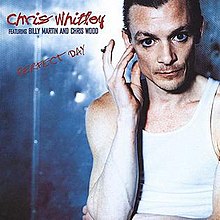
Blood on the Tracks is the fifteenth studio album by American singer-songwriter Bob Dylan, released on January 20, 1975, by Columbia Records. The album marked Dylan's return to Columbia after a two-album stint with Asylum Records. Dylan began recording the album at an A & R studio in New York City in September 1974. In December, shortly before Columbia was due to release the album, Dylan abruptly re-recorded much of the material in Sound 80 studio in Minneapolis. The final album contains five tracks recorded in New York and five from Minneapolis. The album’s songs have been linked to tensions in Dylan's personal life, including his estrangement from his then-wife Sara. One of their children, Jakob Dylan, has described the songs as "my parents talking." In interviews, Dylan has denied that the songs on the album are autobiographical.

"Love and Theft" is the thirty-first studio album by American singer-songwriter Bob Dylan, released on September 11, 2001, by Columbia Records. It featured backing by his touring band of the time, with keyboardist Augie Meyers added for the sessions. It peaked at No. 5 on the Billboard 200, and has been certified Gold by the RIAA. A limited edition release included two bonus tracks on a separate disc recorded in the early 1960s, and two years later, on September 16, 2003, this album was remixed into 5.1 surround sound and became one of 15 Dylan titles reissued and remastered for SACD playback.

Highway 61 Revisited is the sixth studio album by the American singer-songwriter Bob Dylan, released on August 30, 1965, by Columbia Records. Dylan continued the musical approach of his previous album Bringing It All Back Home (1965), using rock musicians as his backing band on every track of the album in a further departure from his primarily acoustic folk sound, except for the closing track, the 11-minute ballad "Desolation Row". Critics have focused on the innovative way Dylan combined driving, blues-based music with the subtlety of poetry to create songs that captured the political and cultural climate of contemporary America. Author Michael Gray argued that, in an important sense, the 1960s "started" with this album.

No Reason to Cry is the fourth solo studio album by Eric Clapton, released by RSO Records on 27 August 1976. The album was recorded in Malibu and Los Angeles between December 1975 to May 1976. The record went silver in the U.K.
Gary Ronnie Stewart was an American musician and songwriter, known for his distinctive vibrato voice and his outlaw country sound influenced by southern rock. At the height of his popularity in the mid-1970s, Time magazine described him as the "king of honkytonk." He had a series of country chart hits from the mid- to late 1970s, the biggest of which was "She's Actin' Single ", which topped the U.S. country singles chart in 1975.
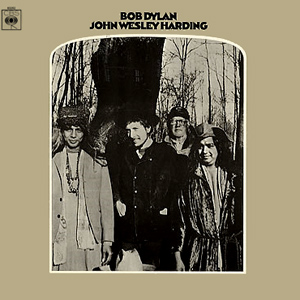
John Wesley Harding is the eighth studio album by the American singer-songwriter Bob Dylan, released on December 27, 1967, by Columbia Records. Produced by Bob Johnston, the album marked Dylan's return to semi-acoustic instrumentation and folk-influenced songwriting after three albums of lyrically abstract, blues-indebted rock music. John Wesley Harding was recorded around the same time as the home recording sessions with The Band known as The Basement Tapes.

Pat Garrett & Billy the Kid is the twelfth studio album and first soundtrack album by American singer-songwriter Bob Dylan, released on July 13, 1973, by Columbia Records for the Sam Peckinpah film of the same name. Dylan himself appeared in the film as the character "Alias". The soundtrack consists mainly of instrumental music and was inspired by the movie itself. The album includes "Knockin' on Heaven's Door", which became a trans-Atlantic Top 20 hit.

"Tangled Up in Blue" is a song by American singer-songwriter Bob Dylan, which was released as the opening track of his 15th studio album Blood on the Tracks (1975). The song was written by Dylan and produced by David Zimmerman, Dylan's brother. Released as a single, it reached No. 31 on the Billboard Hot 100. The song concerns relationships and contains different narrative perspectives. Dylan has altered the lyrics in subsequent performances, changing the point of view and details in the song.
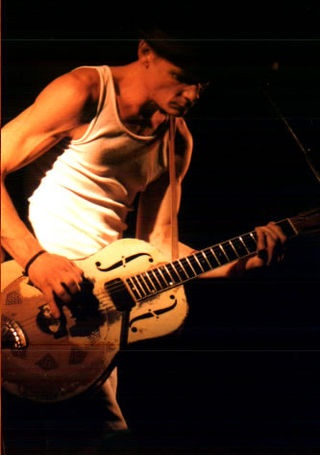
Christopher Becker Whitley was an American blues/rock singer-songwriter and guitarist. Whitley's sound was drawn from the traditions of blues, jazz and rock and he recorded songs by artists from many genres. During his 25-year career, he released 17 albums. While two songs landed in the top 50 of the Billboard mainstream rock charts and he received two Independent Music Awards, he remained on the fringes of both the blues and alternative-rock worlds.

Street-Legal is the eighteenth studio album by American singer-songwriter Bob Dylan, released on June 15, 1978, by Columbia Records. The album was a departure for Dylan, who assembled a large pop-rock band with female backing vocalists for its recording.

Empire Burlesque is the twenty-third studio album by American singer-songwriter Bob Dylan, released on June 10, 1985 on Columbia Records. Self-produced, the album peaked at No. 33 in the U.S. and No. 11 in the UK.

Billy Martin is an American jazz drummer, best known as a member of jazz-funk trio Medeski Martin & Wood.

101 is a live album and documentary film by the English electronic music band Depeche Mode, released on 13 March 1989 by Mute Records. It chronicles the final leg of the band's Music for the Masses Tour and the final show on 18 June 1988 at the Rose Bowl in Pasadena, California.
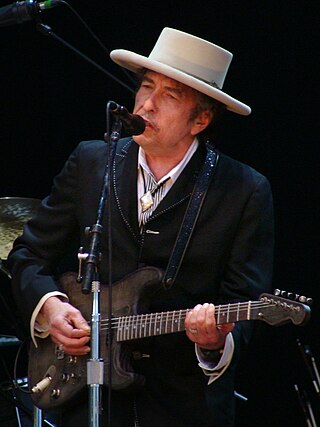
Bob Dylan is an American singer-songwriter. Often considered to be one of the greatest songwriters in history, Dylan has been a major figure in popular culture over his 60-year career. He rose to prominence in the 1960s, when songs such as "The Times They Are a-Changin'" (1964) became anthems for the civil rights and antiwar movements. Initially modeling his style on Woody Guthrie's folk songs, Robert Johnson's blues and what he called the "architectural forms" of Hank Williams's country songs, Dylan added increasingly sophisticated lyrical techniques to the folk music of the early 1960s, infusing it "with the intellectualism of classic literature and poetry". His lyrics incorporated political, social and philosophical influences, defying pop music conventions and appealing to the burgeoning counterculture.

Jimmy LaFave was an American singer-songwriter and folk musician. After moving to Stillwater, Oklahoma, LaFave became a supporter of Woody Guthrie. He later became an Advisory Board member and regular performer at the annual Woody Guthrie Folk Festival.
"If You See Her, Say Hello" is a song by American singer-songwriter Bob Dylan from his 15th studio album, Blood on the Tracks (1975). The song is one of five on the album that Dylan initially recorded in New York City in September 1974 and then re-recorded in Minneapolis. The later recording, made on December 30, 1974, was produced by Dylan's brother David Zimmerman, who was not credited. The recording later became the album track and the B-side of the "Tangled Up in Blue" single, released in February 1975.

Mark Howard is a Canadian record producer, engineer, and mixer, who has worked with artists including Bob Dylan, Tom Waits, The Tragically Hip, Lucinda Williams, Willie Nelson, Marianne Faithfull, Emmylou Harris, U2, Peter Gabriel, R.E.M., Neil Young, Kaizers Orchestra and The Neville Brothers.
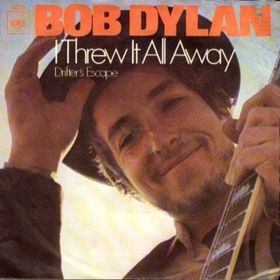
"I Threw It All Away" is a song by American singer-songwriter Bob Dylan. The track appeared on Dylan's album Nashville Skyline in 1969, and was released as its first single later that year, where it reached number 85 on the Billboard Hot 100, and number 30 on the UK Singles Chart. It is considered to be one of the best and most popular songs on the album.

Dislocation Blues is a collaborative studio album, credited to American singer-songwriter and guitarist, Chris Whitley and Australian musician, Jeff Lang. The album was recorded in studios between Adelaide and Melbourne in April 2005, seven months before Chris Whitley's death from lung cancer.

On Air is the fifteenth album by singer-songwriter and guitarist Chris Whitley and his second live album. The performance is a compilation of songs from a selection of Whitley's past albums and three new covers.
